Story of Stephen Jeffers v. School Board 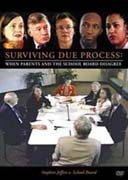
Surviving Due Process: Stephen Jeffers v. School Board is based on a true story.
Stephen is a young child with autism. Two years
ago, his parents placed him in The Early School, a private special
education school that provides intensive one-on-one Applied Behavioral
Analysis (ABA) therapy to youngsters with autism.
Stephen made substantial progress at The Early School so his parents
requested reimbursement for his special education program at the
private school.
The school district refused to provide any reimbursement and offered
to place Stephen into the public school's special education class.
Stephen's parents requested a special education due process hearing
to resolve this dispute.
Trailers
Watch the trailer in Quicktime or on Windows Media Player
Background
The Individuals with Disabilities Education Act requires public
schools to provide a free, appropriate education to qualifying
students with disabilities. If there is a disagreement between
parents and their school district, either party my request a special
education due process hearing.
In Surviving
Due Process: Stephen Jeffers v. School Board, you
will see how a case is prepared and presented by both sides.
The procedure may remind you of a courtroom - and it should. In
many states, due process hearings are quite formal. Each state
has specific regulations that govern the procedure to request
a special education due process hearing and the appointment of
hearing officers.
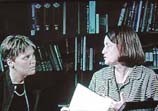 When
this story begins, the school board attorney just learned about
the parents' request for a due process hearing.
When
this story begins, the school board attorney just learned about
the parents' request for a due process hearing.
As the school
board attorney (played by attorney Kathleen Mehfoud) discusses
the case with her assistant (Lori Battin), you will see how she
begins to prepare her case.
Dismissed?
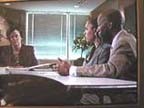 There
are very specific rules that must be followed in due process hearings.
The
parents' case was nearly dismissed because they misunderstood
the legal requirements for exchange of documents and witness lists.
There
are very specific rules that must be followed in due process hearings.
The
parents' case was nearly dismissed because they misunderstood
the legal requirements for exchange of documents and witness lists.
The
Hearing Officer presides over the procedure, listens to all testimony,
weighs the evidence and makes decisions. Generally, it is not
the Hearing Officer's responsibility to assist either party.
After hearing from both sides, the hearing officer (played by
Darrel Tillar Mason) gave the parents a 30 day continuance to
prepare their case -- over the objections of school board counsel.
 Searching
for an Attorney
Searching
for an Attorney
Mr. and Ms. Jeffers began to search for an attorney who can represent
them - not an easy task. After a telephone call to Pete
Wright about their situation, they decide to meet with him.
Preparing
for a Due Process Hearing
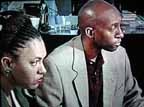 During
their meeting with Pete and Pam Wright, Pete discusses strategies
and the issues of their case. He gives the parents a list of things
to learn and do before the due process hearing resumes.
During
their meeting with Pete and Pam Wright, Pete discusses strategies
and the issues of their case. He gives the parents a list of things
to learn and do before the due process hearing resumes.
As Pete tells Mr. and Ms. Jeffers, "The key to a successful
outcome is preparation, preparation, preparation."
Due
Process Hearing Resumes
The School
Board Presents Its Case
 Several
witnesses testify for the school board, including the special
education
teacher, the occupational therapist who has worked with Stephen,
and the director of special education.
Several
witnesses testify for the school board, including the special
education
teacher, the occupational therapist who has worked with Stephen,
and the director of special education.
Issues raised by the school board include:
*
The private school does not provide specific related services
that Stephen needs.
* The lack of "group experiences" in the private special
education school prevents Stephen from learning from his non-disabled
peers.
* Benefits of the public school program as evidenced by progress
made by other students who have similar disabilities.
The Parents Present Their Case
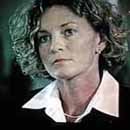 Several
witnesses testify for the parents, including the child psychologist
who evaluated Stephen and observed his program at The Early School,
the program specialist who supervises Stephen's educational program
and therapists, the principal of The Early School, and Stephen's mother.
Several
witnesses testify for the parents, including the child psychologist
who evaluated Stephen and observed his program at The Early School,
the program specialist who supervises Stephen's educational program
and therapists, the principal of The Early School, and Stephen's mother.
Issues raised by the parents include:
*
The public school teachers and service providers are overburdened
and cannot meet Stephen's needs.
 *
Stephen requires intensive one-on-one instruction to make progress.
*
Stephen requires intensive one-on-one instruction to make progress.
* The public school program will damage Stephen because it does not
meet his unique needs.
* Stephen's behaviors are too severe and too unusual to be handled
in a group classroom setting.
 Stephen's
mother is the last witness to testify.
Stephen's
mother is the last witness to testify.
Ms. Jeffers testifies about the family's reaction when they learned
that Stephen has autism, describes Stephen's program at the Early
School, and her observations of the public school program. She describes
Stephen's progress and shares her fears that if Stephen has to leave
The Early School before he is ready, he will regress and lose the
gains he has made during the past two years.
Closing
Arguments, Briefs
 After
the final witness testifies, the hearing officer usually discusses
procedural matters. Each party may have an opportunity to make closing
comments, oral or written, in the form of a legal brief. Each side
will summarize the case and explain how the evidence makes it the
duty of the hearing officer to decide in their favor.
After
the final witness testifies, the hearing officer usually discusses
procedural matters. Each party may have an opportunity to make closing
comments, oral or written, in the form of a legal brief. Each side
will summarize the case and explain how the evidence makes it the
duty of the hearing officer to decide in their favor.
After
oral arguments, or in lieu of these arguments, the hearing officer
may request that each party prepare written "Findings of Fact
and Conclusions of Law." The briefing schedule may depend on
when the Court Reporter is able to complete the written transcripts.
Note:
For purposes of brevity, many scenes, witness testimony, objections
by attorneys, legal arguments, and rulings by the hearing officer
were not included in this film.
Learn more about Surviving Due Process: Stephen Jeffers v. School Board:
Trailer (Quicktime)
Trailer (Windows Media Player)
Read the Story
Meet the Cast
List of Scenes
Internet Orders
Fax & Mail Orders
Updates
on the Case
When
Surviving
Due Process was being filmed, the due process hearing in Z.P.
v. Henrico School Board had just been held. The story of Surviving
Due Process: Stephen Jeffers v. School Board was based on the
facts in Z.P. v. Henrico School Board.
The individuals who played the roles of teachers, therapists, psychologist,
special ed director, and attorneys in Surviving
Due Process read the transcript of the Z.P. v. Henrico School
Board due process hearing. At the time the DVD was filmed, the
hearing officer had not issued a decision.
What happened next?
The parents received a favorable decision from the hearing officer.
The school district appealed to U. S. District Court. The District
Court reversed the hearing officer and found for the school district.
The parents appealed this decision to the U. S. Court of Appeals for
the Fourth Circuit. The Court heard oral argument on September 29,
2004.
On February 11, 2005, in a 2-1 split decision, the U. S. Court of
Appeals for the Fourth Circuit reversed the District Court and remanded
the case back with instructions. Read School
Bd of Henrico County VA v. Z.P. in html.
School
Bd of Henrico County VA v. Z.P. is also available in pdf at
https://www.wrightslaw.com/law/caselaw/05/4th.henrico.va.zo,pdf
Does this mark the end of School Bd of Henrico v. Z.P.? Yes.
After the favorable pro-parent decision by the 4th Circuit, the case
settled.

